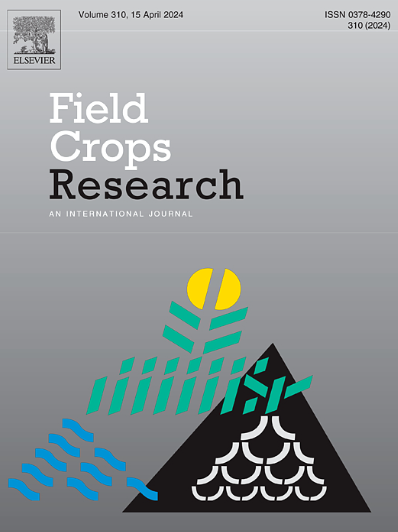长期施肥和小麦营养需求形成的根杆菌提高了粮食产量和土壤的多功能性
IF 6.4
1区 农林科学
Q1 AGRONOMY
引用次数: 0
摘要
由农业实践和植物营养需求形成的微生物群落对作物适应性和生产力至关重要。因此,研究土壤微生物群落在不同养分条件下对这些因子的响应,对作物生长、土壤多功能性增强和农业可持续发展管理优化具有重要意义。通过9年施肥灌溉试验,研究了土壤性状、酶活性、微生物组成和功能基因对小麦籽粒产量和土壤肥力的影响。结果表明,施氮磷钾(C)和施有机肥(M)的小麦产量分别比不施氮磷钾(CK)增产112.1 % ~ 204.1 %和83.4 % ~ 185.8 %。M的微生物多样性、网络复杂性、酶活性和SMF均高于C和CK。此外,施肥制度与小麦对丰富的关键细菌种类(如链霉菌科、根瘤菌科、黄菌科和鞘菌科)和功能基因(如碳降解、反硝化、硝化、磷转运和有机磷矿化)的营养需求相互作用,这对小麦产量和SMF有积极影响。有趣的是,灌溉对根际微生物组成和功能、小麦产量和SMF没有显著影响,但提高了C和m地区小麦产量的稳定性。综上所述,我们的研究结果表明,在华北平原小麦-玉米集约种植系统中,农业实践(施肥和灌溉)和作物营养需求之间的相互作用在维持产量可持续性和SMF方面具有潜在的潜力。本文章由计算机程序翻译,如有差异,请以英文原文为准。
Rhizobacteria shaped by long-term fertilization and wheat nutritional requirements improve grain yield and soil multifunctionality
The microbial communities shaped by agricultural practices and plant nutritional requirements are critical for crop adaptability and productivity. Therefore, elucidating how soil microbial communities respond to these factors under different nutrient conditions is important for crop growth, soil multifunctionality (SMF) enhancement, and management optimization for sustainable agriculture development. We investigated the effects of soil properties, enzyme activities, microbial composition and functional genes on wheat grain yield and SMF with a 9-year fertilization and irrigation experiment. Results showed that wheat grain yield in NPK fertilizers (C) and manure (M) was 112.1 %-204.1 % and 83.4 %-185.8 % higher than that in no fertilizer (CK), respectively. M had higher microbial diversity, network complexity, enzyme activity and SMF than C and CK. Furthermore, fertilization regimes interacted with wheat nutritional requirements to enriched key bacterial species (e.g., Streptomycetaceae, Rhizobiaceae, Xanthomonadaceae, and Sphingobacteriaceae) and functional genes (e.g., carbon degradation, denitrification, nitrification, phosphorus transport, and organic phosphorus mineralization), which positively affected wheat grain yield and SMF. Interestingly, irrigation did not significantly affect rhizosphere microbial composition and function, wheat grain yield, and SMF, but enhanced stability of wheat grain yield in C and M. In conclusion, our results suggest the potentials of interactions between agricultural practices (fertilization and irrigation) and crop nutritional requirements in maintaining yield sustainability and SMF within intensive wheat-maize cropping system in the North China Plain.
求助全文
通过发布文献求助,成功后即可免费获取论文全文。
去求助
来源期刊

Field Crops Research
农林科学-农艺学
CiteScore
9.60
自引率
12.10%
发文量
307
审稿时长
46 days
期刊介绍:
Field Crops Research is an international journal publishing scientific articles on:
√ experimental and modelling research at field, farm and landscape levels
on temperate and tropical crops and cropping systems,
with a focus on crop ecology and physiology, agronomy, and plant genetics and breeding.
 求助内容:
求助内容: 应助结果提醒方式:
应助结果提醒方式:


